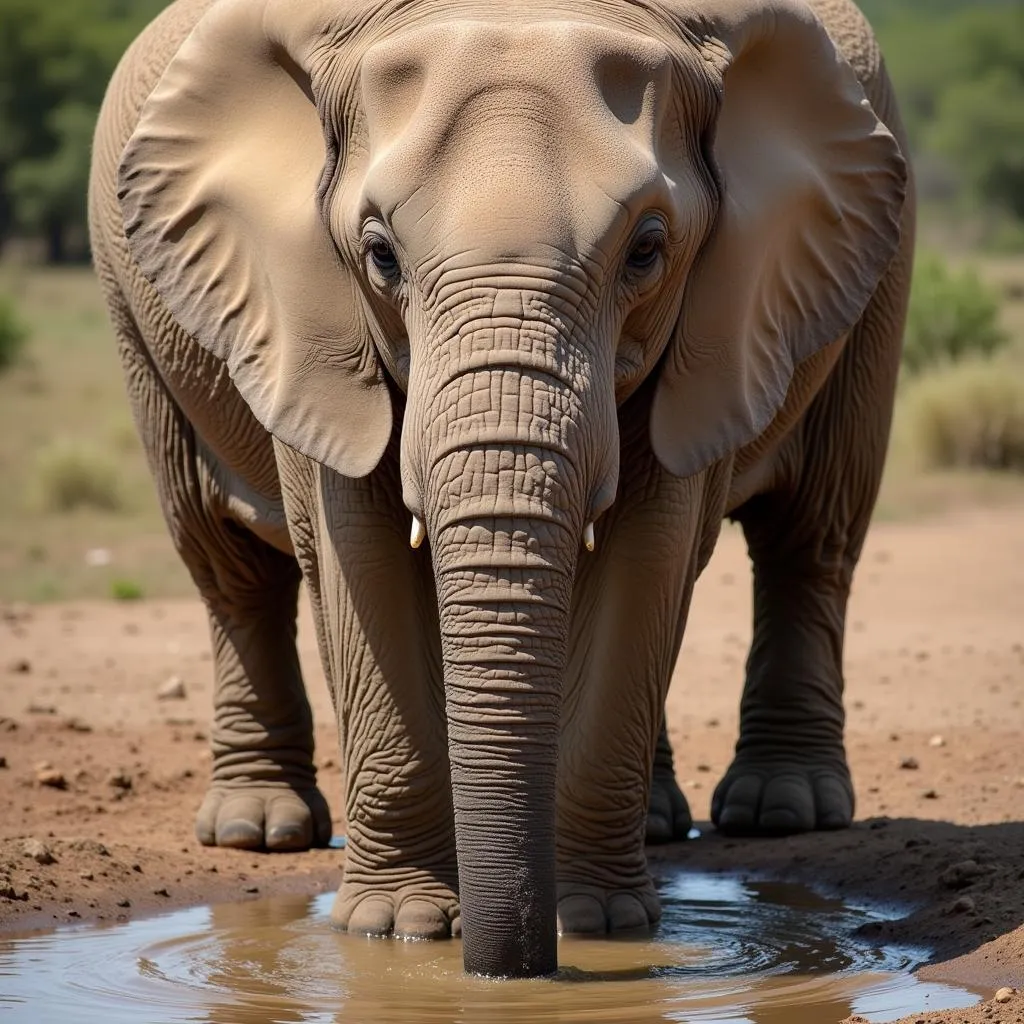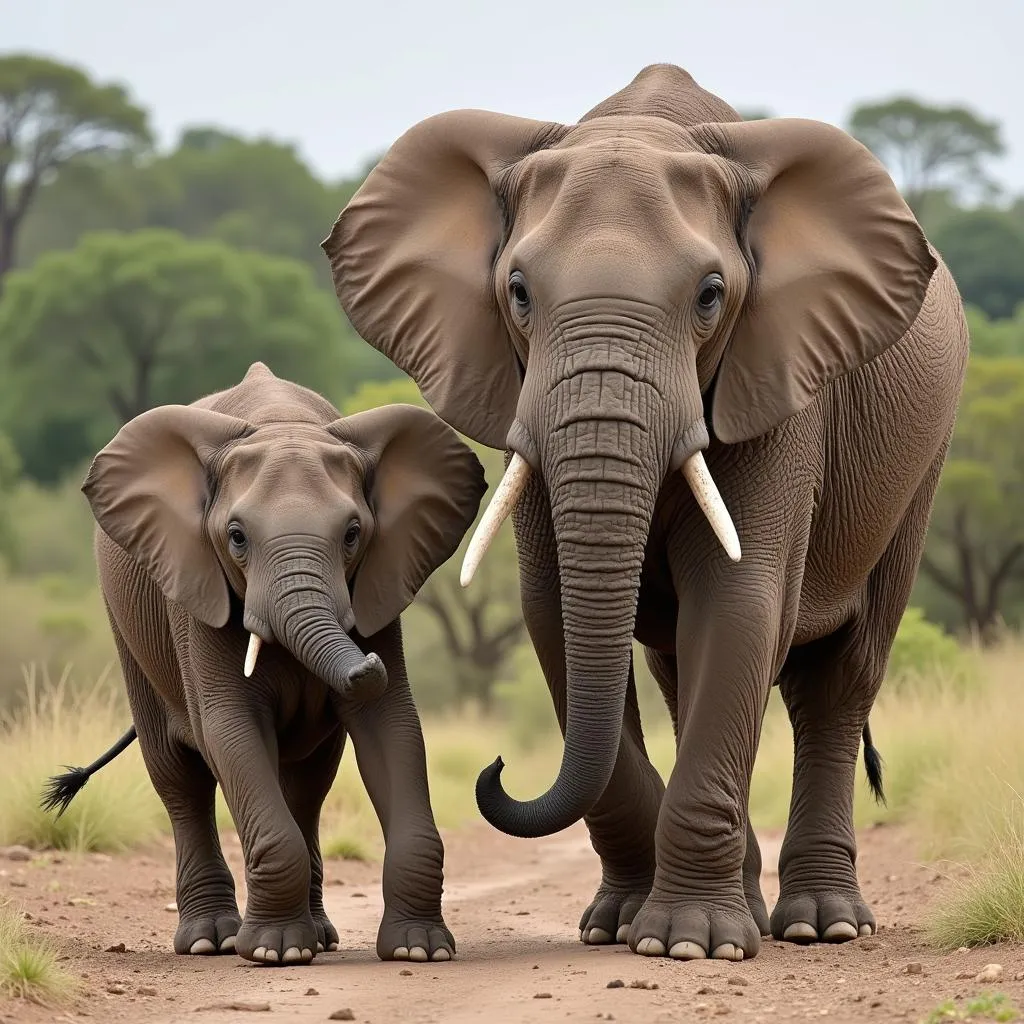African Elephant Facts for Kids
African elephants are the largest land animals on Earth! These gentle giants are fascinating creatures with big ears, tusks, and trunks. Let’s learn some amazing facts about them!
What Makes African Elephants So Special?
African elephants are easily recognizable by their large size, floppy ears, and of course, their trunks! Did you know their trunks are actually a combination of their nose and upper lip? It’s true! They use their trunks for so many things – like breathing, smelling, trumpeting warnings, drinking water, and even giving elephant hugs!
 African Elephant Trunk
African Elephant Trunk
Where do African Elephants Live?
African elephants are found in many countries in Africa, south of the Sahara Desert. They can live in a variety of habitats like savannas, forests, deserts, and even swamps.
What do African Elephants Eat?
African elephants are herbivores, which means they are plant eaters. They spend most of their day eating grasses, leaves, fruits, bark, and roots. They need to eat a LOT to fuel their big bodies!
How Big do African Elephants Get?
African elephants can grow to be really big! An adult African elephant can be as tall as a double-decker bus! That’s about 10-13 feet tall! They can also weigh as much as 6-13 thousand pounds!
How Long do African Elephants Live?
African elephants can live for a long time – usually around 60-70 years. That’s almost as long as a human!
What are the Different Types of African Elephants?
There are two main types of African elephants: the African bush elephant and the African forest elephant. They are both African elephants, but they have some differences.
African Bush Elephants
- Are the largest of all elephant species.
- Have larger ears that look a bit like the continent of Africa!
- Live in grasslands and savannas.
African Forest Elephants
- Are slightly smaller than bush elephants.
- Have smaller, rounder ears.
- Live in dense forests.
 African Bush and Forest Elephants
African Bush and Forest Elephants
Are African Elephants Endangered?
Sadly, yes, both African bush elephants and African forest elephants are endangered. This means there are not many of them left in the wild.
Why are African Elephants Endangered?
- Habitat Loss: As humans build more houses and farms, elephants are losing their homes.
- Poaching: Sadly, some people hunt elephants illegally for their ivory tusks.
- Human-Elephant Conflict: Sometimes, elephants come into contact with humans when they are looking for food and water, and this can lead to conflict.
What Can We Do to Help African Elephants?
Even though we might not live in Africa, there are still things we can do to help protect these amazing animals:
- Learn More: Share what you have learned about African elephants with your friends and family!
- Support Conservation Efforts: You can support organizations that are working to protect elephants and their habitats.
- Reduce Your Impact: Try to reduce your use of products that harm the environment. This helps protect the habitats of elephants and other animals.
African elephants are truly magnificent creatures. By learning about them and taking action to protect them, we can help ensure that these gentle giants continue to roam the African wilderness for generations to come.
FAQ
Q: How can I tell the difference between an African elephant and an Asian elephant?
A: African elephants have larger ears shaped like the continent of Africa, while Asian elephants have smaller, rounder ears. African elephants also have two “fingers” at the tip of their trunks, while Asian elephants only have one.
Q: How intelligent are African elephants?
A: African elephants are highly intelligent animals known for their excellent memory and complex social structures. They display grief, empathy, and even self-awareness.
Q: Do all African elephants have tusks?
A: No, not all African elephants have tusks. Tusks are actually large teeth that continue to grow throughout an elephant’s life. Unfortunately, poaching for ivory has led to a decline in the number of elephants with tusks.
For more fascinating facts about African wildlife, check out these articles:
Do you want to discover more incredible African elephant facts for children? Explore the wonders of the animal kingdom and join us in appreciating these magnificent creatures! Remember, every little effort counts in protecting our planet and its amazing wildlife.
Need Help? Contact us 24/7: Phone: +255768904061, Email: [email protected] Or visit: Mbarali DC Mawindi, Kangaga, Tanzania.